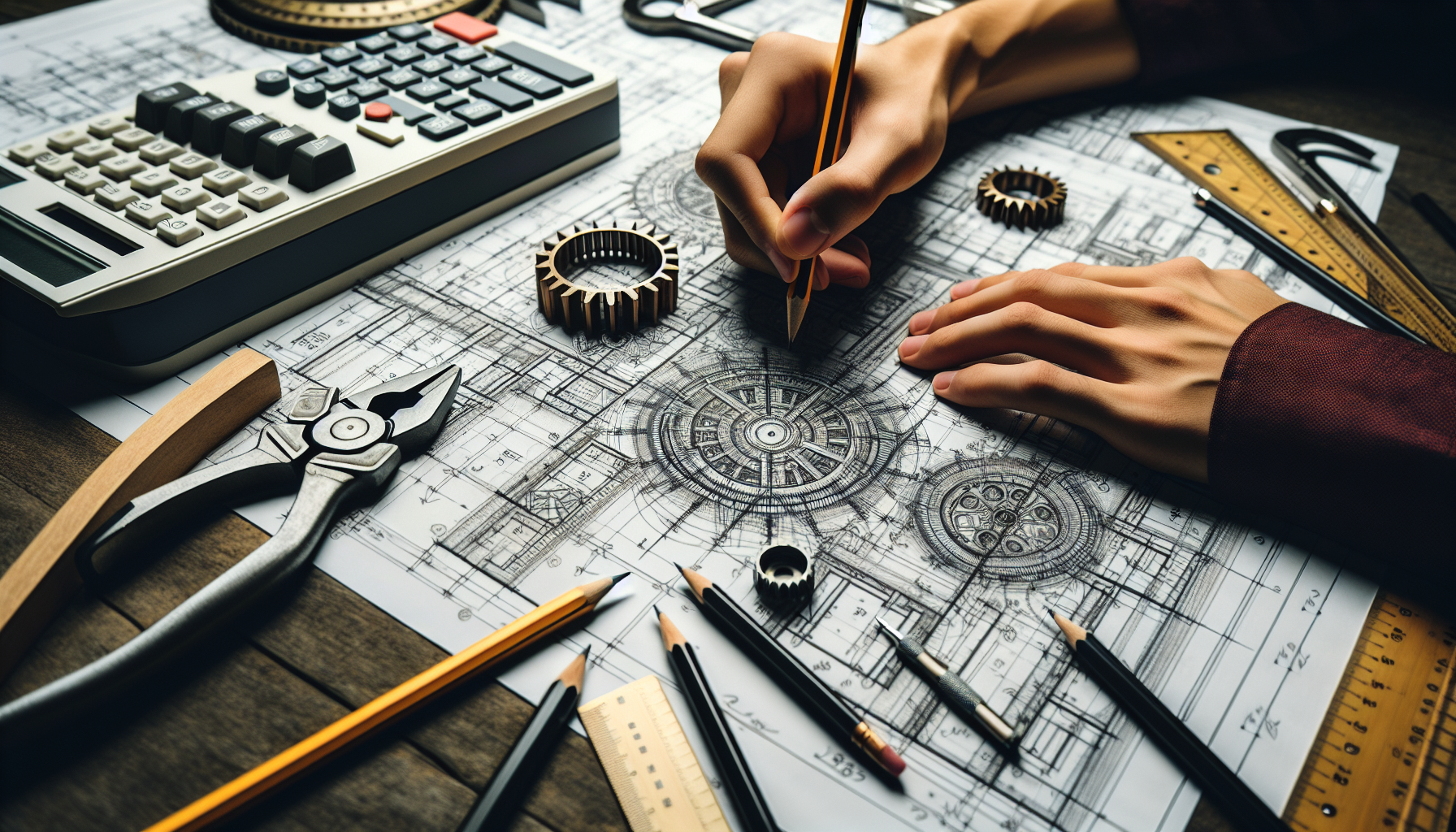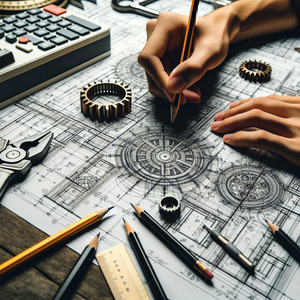The Art of Sound Design: Careers in Pedal Engineering

Pedal engineering is a multifaceted discipline that encompasses several roles, including design, programming, and marketing. Each of these roles contributes uniquely to the lifecycle of a compressor pedal, from conception to consumer use.
Design Engineers
Design Engineers are responsible for the aesthetic and functional aspects of pedals. This role requires a blend of artistic vision and technical knowledge, as designers must ensure that products not only look appealing but also meet the rigorous demands of musicians. They work closely with sound engineers to ensure that the pedal’s functionality aligns with user expectations. For example, a designer might collaborate with musicians to identify key ergonomic features that enhance playability while also crafting a visually striking exterior.
Sound Programmers
Sound Programmers focus on the technical side of pedal creation. They are tasked with developing algorithms and circuit designs that dictate how pedals manipulate sound. Their work is crucial in ensuring that the pedal delivers high-quality audio while maintaining user-friendly controls. For instance, a sound programmer may work on a new compressor pedal that allows for nuanced control over compression ratios, making it appealing for both studio recording and live performances.
Marketing Professionals
Marketing Professionals bridge the gap between the product and the consumer. They craft compelling narratives around the pedals, highlighting unique features and benefits. Their role is essential for establishing a brand presence in the competitive market of music technology. Effective marketing can mean the difference between a pedal becoming a must-have item or fading into obscurity. A successful campaign might involve engaging demonstrations at trade shows or leveraging social media platforms to showcase artists using the pedal.
Leading Companies in Pedal Engineering
Several companies stand at the forefront of pedal engineering, each contributing to the field with innovative products and technologies. Brands like BOSS, MXR, and Electro-Harmonix have long been household names in the music community, known for their quality and reliability. More recently, startups like Keeley Electronics and Wampler Pedals have emerged, pushing the boundaries of what is possible with effects pedals.
Skills and Experiences Needed to Succeed
To succeed in the field of pedal engineering, individuals must cultivate a diverse skill set that combines technical know-how with creative thinking. Here are some essential skills for aspiring professionals: Technical Proficiency: A strong understanding of electronics, sound theory, and audio engineering principles is crucial. Many engineers pursue degrees in electrical engineering or audio production to gain foundational knowledge. Familiarity with circuit design and audio processing software can also be beneficial. Creativity: Designing a pedal is as much an art as it is a science. Engineers must think creatively to develop unique features that differentiate their products in a crowded market. For example, an engineer may innovate a new type of modulation effect that allows for greater sonic exploration. Communication Skills: Collaboration is key in pedal engineering. Whether working with designers, programmers, or marketers, effective communication ensures that everyone is on the same page and contributes to a cohesive final product. Regular team meetings and brainstorming sessions can enhance the creative process. Networking: Building relationships within the industry can open doors to job opportunities and collaborations. Attending trade shows, participating in online forums, and leveraging social media platforms like LinkedIn can be invaluable for making connections. Aspiring pedal engineers should actively engage with industry professionals, sharing insights and seeking mentorship.
The world of pedal engineering is a vibrant and rewarding field that merges art and technology in exciting ways. From the design of the pedal itself to the intricate programming that brings sound to life, this industry offers numerous career paths for those passionate about music and sound design. As the demand for innovative effects pedals continues to rise, so do the opportunities for professionals in this niche. For aspiring engineers and designers, the journey from hobbyist to professional is not only achievable but also filled with potential to shape the future of music. Whether you aim to create the next game-changing compressor pedal or bring a fresh perspective to sound engineering, the path is open for you to explore. Ultimately, the art of sound design in pedal engineering is not just about creating products; it’s about crafting experiences that resonate with musicians and audiences alike.
Analog Circuit Designer
BOSS, Electro-Harmonix, Keeley Electronics
Core Responsibilities
Design and develop analog circuits for effects pedals, focusing on sound quality and reliability.
Collaborate with sound engineers to optimize circuit performance and ensure user satisfaction.
Prototype and test new circuit designs while troubleshooting any issues that arise during development.
Required Skills
Proficiency in circuit design tools (e.g., SPICE) and a solid understanding of electronic components.
Experience in audio electronics, particularly in designing effects for guitar and other instruments.
Strong problem-solving skills and attention to detail.
Digital Signal Processing (DSP) Engineer
MXR, Strymon, Line 6
Core Responsibilities
Develop and optimize algorithms for sound manipulation in digital effects pedals.
Work closely with hardware engineers to integrate DSP chips into pedal designs.
Conduct performance testing and user experience evaluations to refine sound quality.
Required Skills
Strong knowledge of DSP theory and programming languages (e.g., C/C++, MATLAB).
Experience with audio processing techniques and tools (e.g., FFT, filters).
Ability to translate complex technical concepts into user-friendly features.
Product Marketing Specialist
Wampler Pedals, Boss, Mooer Audio
Core Responsibilities
Create marketing strategies and campaigns to promote new pedal launches and enhance brand visibility.
Develop product documentation, including user manuals and promotional content highlighting unique pedal features.
Analyze market trends and consumer feedback to refine marketing approaches.
Required Skills
Strong writing and communication skills, with experience in digital marketing and content creation.
Familiarity with the music industry, particularly effects pedals and audio equipment.
Proficiency in using analytics tools to track campaign performance.
Sound Designer for Live Performance
Major touring bands, sound production companies, and event organizations
Core Responsibilities
Collaborate with artists and sound engineers to design custom pedal setups for live shows.
Create and program sound patches that enhance live performance experiences.
Troubleshoot technical issues during rehearsals and performances to ensure seamless sound delivery.
Required Skills
Extensive knowledge of various effects pedals and their applications in live settings.
Proficiency in audio editing software and live sound mixing techniques.
Strong interpersonal skills to work effectively with musicians and technical teams.
User Experience (UX) Designer for Audio Products
Electro-Harmonix, Keeley Electronics, Boss
Core Responsibilities
Conduct user research to understand musician needs and preferences regarding pedal design and functionality.
Create intuitive user interfaces for pedals that enhance user interaction and accessibility.
Collaborate with product development teams to ensure that design concepts align with technical capabilities.
Required Skills
Experience with UX/UI design tools (e.g., Sketch, Figma) and prototyping.
Understanding of audio equipment usability and ergonomics.
Ability to translate user feedback into actionable design improvements.


